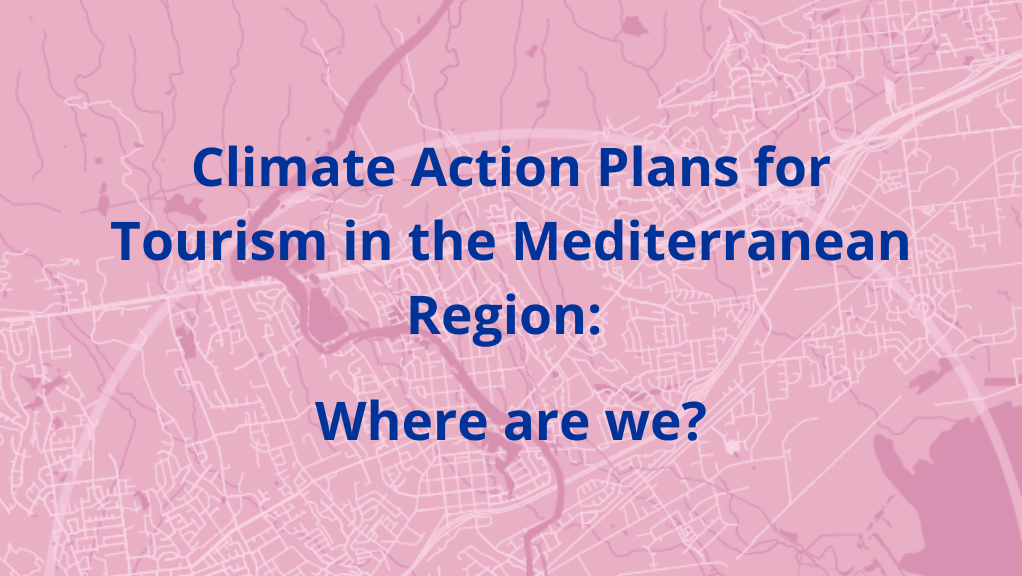From setting the stage to implementing tourism regional climate action plans, 3 online sessions were organised, early this year, to help more than 230 participants from local, regional and national public authorities, DMOs, and interest groups such as NGOs, higher education and research institutes and SMEs to create and develop climate action plans and strategies in line with the Glasgow Declaration for Climate Action in Tourism initiative.
In response to the urgent call of the Glasgow Declaration on Climate Action in Tourism, and following a first Capacity Building session held in Almeria on 21 November 2024, as a side event of the Sun&Blue Tourism Innovation Congress, the online sessions reached further actors of the Mediterranean Region working on Tourism and who are interested in creating an action plan to tackle climate change.
The main resources for the training were the Blueprint for Tourism Climate Action Plans developed by the Travel Foundation under the coordination of NECSTouR and the CPMR-IMC within the Governance Project Community4Tourism, and the Climate Action Planning Toolkit developed by the Travel Foundation under the coordination of the CPMR-IMC within the Thematic Project NaTour4CChange.”
A picture of the current scenario
The online sessions also offered the opportunity to collect valuable data from participants via a post-training feedback survey.
Indeed, 44 respondents from 41 different organisations working in the sector shared information regarding the ongoing state of the implementation of climate action plans in their organisations.
- Respondents reporting that their organisation currently has a climate action plan 16%
- Respondents indicating that their organisation is in the early stages of developing a climate action plan 25%
- Respondents reporting that their organisation is in the phase of exploring the need for a climate action plan 18%
- Respondents indicating that their organisation has not yet initiated any action in this area 32%
As data shows, there is still significant room for improvement in aligning Mediterranean tourism organisations with the Glasgow Declaration and accelerating climate action in the sector.
%
Respondents confirming that their organization has signed the Glasgow Declaration
%
Over 90% of respondents found the main resources useful and practical
Recommendations for future training initiatives for Climate Action Planning in Tourism
The full capacity building process, which includes the needs assessment, the capacity building session in Almeria, the online training series, and – last but not least – the participants feedback, made possible a series of recommendations to be taken into account in future training activities design focusing on climate action planning in tourism.
Strengthen practical application of Climate Action Planning
Future sessions should emphasize hands-on, scenario-based learning where participants can apply concepts directly to their regional contexts.
Tailor training to diverse stakeholders
To maximise the relevance and impact of future training initiatives, programmes should be tailored to the specific needs and roles of different tourism stakeholders.
Address priority topics and identified knowledge gaps
The topics identified are:
- Securing funding for climate initiative
- Stakeholders engagement
- Strategies for carbon emissions reduction
- Risk Assessment and adaptation planning
- Monitoring and tracking progress
- Accessing reliable information and planning tools
Foster interactivity, P2P learning, and co-creation
Training formats should prioritize dynamic, participatory learning, such as peer-to-peer exchange, group-based exercises, regional collaboration labs, and opportunities to co-create climate action strategies.
Ensure follow-up support and continued access to resources
Training should not be a one-off event. Future initiatives should include follow-up support. Besides, a centralised resource hub should be developed to give participants access to tools, templates, case studies, presentations, and recorded training content. To this extent, platforms like the Sustainable Tourism Join the MED platform and the Interreg Euro-MED Academy, could respond to this need.
Promote alignment with the Glasgow Declaration and encourage active engagement
The training programme should further promote the principles and commitments outlined in the Glasgow Declaration for Climate Action in Tourism.


